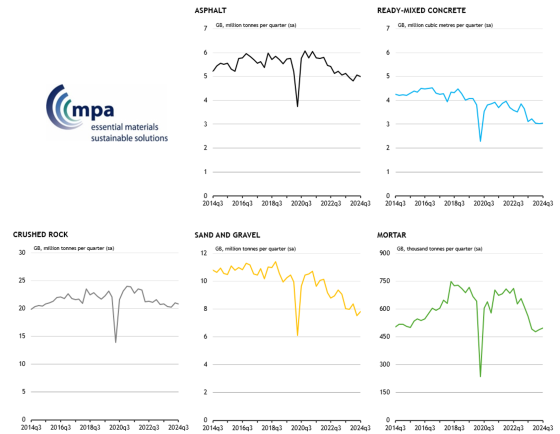The MPA sales survey for the third quarter of 2024 shows modest growth from a low base in some markets, following a prolonged downturn that began in mid-2022.
The survey shows a 0.9% rise in ready-mixed concrete sales compared to the previous quarter, alongside gains of 3.7% in sand & gravel and 2.2% in mortar. Regionally, sales of ready-mixed concrete grew in five of Great Britain’s 11 regions, with the Southeast and West Midlands seeing the strongest gains.
According to MPA analysts, this modest upward trend suggests that demand is now stabilising, although overall volumes remain well below historical levels. Year-to-date sales volumes continue to lag behind 2023 levels, with ready-mixed concrete sales 14.1% lower than in 2023, sand & gravel down 10.5% and mortar sales down 20.1% on last year.
The house-building sector drives the majority of mortar demand and around 30% of ready-mixed concrete. When house-building activity falls, so do sales of the materials on which it depends.
Sales of asphalt and crushed rock have also declined, attributed to budget constraints impacting local authority road maintenance projects and delays in/cancellation of national road-building schemes.

However, there are pockets of growth, primarily centred on major infrastructure projects such as including HS2, Hinkley Point C and groundworks starting at Sizewell C. Additionally, work on new gigafactories such as the £4bn Agratas battery plant in Somerset continues to provide support to sales of aggregates and ready-mixed concrete.
MPA director of economic affairs Aurelie Delannoy said: “The latest data suggests that construction mineral markets may have reached a low point, with early signs of recovery in some regions and markets. Yet, the demand environment remains challenging, with prospects hinging on a recovery in housing, progress on infrastructure delivery, and sufficient funding for local road maintenance.
“As we look toward 2025, we remain cautiously optimistic that an improving economic backdrop will support a gradual return to growth across the industry.”
However, the recent budget statement form the government has tempered that optimism. “The increased tax burden complicates conditions for mineral products producers at a time when a steady supply of these materials is essential for economic growth and for advancing Britain’s decarbonisation targets,” Delannoy added.



